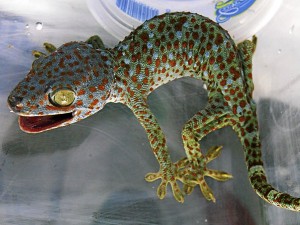
A gecko or Tuko is among 150 confiscated reptiles now at the Ninoy Aquino Parks and Wildlife in Quezon City. BERMUDEZ/INQUIRER
MANILA, Philippines—For now, the geckos—or “tuko”—may be a little safer in the trees or houses where they live.
Spurred by its successful crackdown on smugglers of precious black corals, Customs Commissioner Angelito Alvarez on Thursday ordered his bureau’s agents to watch out against attempts to smuggle geckos out of the country.
Alvarez said the collection and export of geckos was prohibited without the permission of the Department of Environment and Natural Resources.
“If they find a shipment, they should hold it and ask for the permit, Alvarez told reporters. “If [the trader] cannot show any permit, then we will turn the cargo over to the DENR.”
Alvarez said he issued the order following reports that poachers were collecting geckos because of the high demand for them abroad for their supposedly medicinal powers.
Poachers reportedly earn as much as P50,000 per gecko caught in the wild.
“It seems their value now is quite high because of the big demand. Although they are not endangered, they are regulated. You have to secure the approval of the DENR first,” Alvarez said.
The Protected Areas and Wildlife Bureau earlier said it had not issued any permit for the collection of geckos from the wild. Those caught poaching geckos face four years in prison and up to P300,000 in fines, it said.
The Bureau of Customs in May foiled an attempt by some traders to smuggle out of the country P35 million worth of rare black corals and other endangered marine species.
The Department of Health on Thursday knocked down claims that geckos can cure asthma and AIDS (acquired immune deficiency syndrome).
In a public advisory, the DOH said: “We do not recommend it as cure for any ailment.”
“The use of geckos as cure, which is unproven and have no scientific basis, could be dangerous because patients might not seek the proper treatment for their diseases, like asthma, which could become more serious and later require hospitalization and other more complicated as well as more expensive treatment,” the advisory said.
“Further, this is likely to aggravate their overall health and put them at greater risk.”
For diseases such as asthma, the DOH said there are currently “very effective” treatments that are easily available at affordable prices and can provide relief.
With regular treatment, asthmatics can successfully control symptoms of the disease and live a comfortable, healthy life, it said.
For those stricken with the AIDS-causing HIV (human immunodeficiency virus), there are now available antiviral medications that can control the progress of the disease, according to the DOH.
Geckos are small reptiles comparable to lizards, only that they have broad toes, big eye pupils and scaly skins. Over 1,000 species of geckos exist in warm climates throughout the world.
They make loud chirping sounds when they communicate with others from their species and most of them feed on beetles, butterflies, crickets and cockroaches.
Geckos are known to have a firm grip on walls and ceilings with the help of hairlike projections on their toes. They are also said to be at home in forested areas and rocky cliffs.
The belief that geckos can be processed into a cure for cancer and AIDS had fed a thriving industry in East Asia while decimating local populations of the animal known to Filipinos as tuko.
Theresa Mundita Lim, the PAWB director, said the trade in geckos had become “alarming.”
“Reports reaching us show that the collection is now happening throughout the country,” she said.
Lim said local geckos were reportedly being smuggled to China and Korea, where they are considered raw ingredients for alternative medicine.
“We’ve been hearing that it’s being used in Chinese traditional medicine (where) they use both the house lizard and the tokay gecko,” Lim told the Inquirer. With Inquirer Research